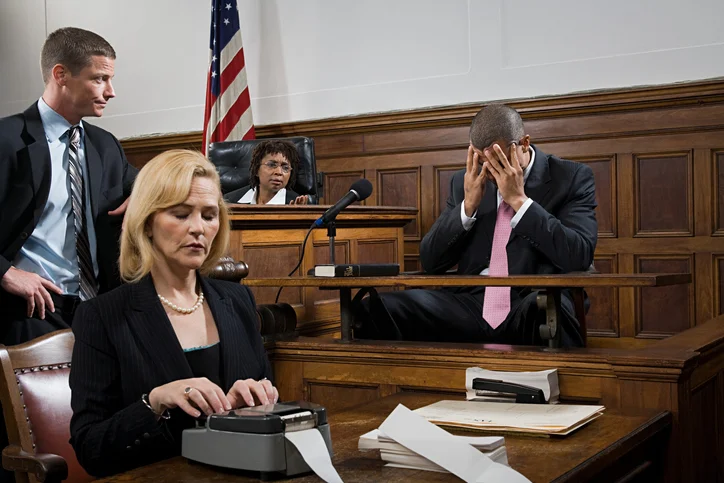Understanding the Significance of Court Coverage in Legal Services and Procedures
Court reporting plays a pivotal role in the legal landscape, offering as the foundation of exact documents in numerous lawful procedures. By supplying verbatim transcripts, court reporters guarantee that every testimony and argument is meticulously recorded, therefore securing the stability of the judicial process.
Function of Court Reporters

Along with transcription, stenotype reporter are frequently tasked with managing and keeping the circulation of procedures. They need to be efficient in legal terminology and have a comprehensive understanding of court room procedures to make sure that the record mirrors the context and subtleties of the discussion. Their work may additionally extend past typical courts, encompassing administrative hearings, mediations, and other legal setups where documentation is important.
Additionally, stenotype reporter might supply real-time reporting, making it possible for instant access to records during process, which can be important for the efficient management of justice. By making sure that a precise document is maintained, court press reporters maintain the integrity of the lawful process, promoting charms and offering as an important source for legal specialists in their pursuit of justice.
Value of Accuracy

The duty of precision extends beyond simple transcription; it incorporates the ability to capture the nuances of speech, including tone, focus, and non-verbal hints, which can be critical in comprehending the context of declarations made. A specific record ensures that all parties included-- courts, lawyers, and juries-- have access to the same information, fostering fairness and openness in the judicial procedure.
In addition, exact records are crucial for the appellate process, where higher courts depend on them to review lower court choices. Errors can endanger the result of an appeal, potentially influencing an event's freedoms and rights. Hence, the dedication to accuracy in court reporting is not simply a specialist responsibility but a cornerstone of justice that promotes the regulation of legislation.
Kinds Of Lawful Procedures
Covering a wide selection of lawful contexts, court reporters are important in various kinds of legal process, each needing distinct strategies and skills. Among one of the most common kinds are civil litigation, criminal tests, and administrative hearings. In civil lawsuits, court press reporters capture depositions, movements, and testaments, making certain that every detail is recorded precisely for possible charms or negotiations.
In criminal trials, the duty of court reporters comes to be even a lot more crucial, as they record all elements of the process, consisting of jury options, witness testaments, and punishing phases - Court Reporting. The accuracy and immediacy of these documents are vital, provided the prospective consequences for defendants and the integrity of the judicial system
Management hearings, commonly conducted by governmental agencies, also rely on court reporters to keep main records of procedures. These hearings can entail conflicts concerning regulative compliance, work concerns, or specialist licensing, necessitating accurate documentation.
Additionally, specialized proceedings such as settlement and mediation require court press reporters to catch the nuances of contracts and arrangements. Each kind of lawful proceeding presents one-of-a-kind difficulties, underscoring the relevance of skilled stenotype reporter in upholding the integrity of the legal process.
Innovation in Court Reporting
Developments in technology have reinvented the area of court reporting, boosting both efficiency and accuracy in the transcription process. Typical techniques of hand-operated note-taking have actually been supplemented and, sometimes, replaced by innovative electronic devices that improve operations and improve accuracy (Court Reporting). Court reporters currently use sophisticated steno devices furnished with real-time transcription capabilities, permitting instant accessibility to a verbatim account of proceedings
In addition, the combination of speech recognition software program has better changed the coverage landscape. This modern technology makes it possible for the automated transcription of spoken words, significantly decreasing the moment required for click to find out more producing official records. In addition, cloud-based systems assist in easy storage and retrieval of records, ensuring that lawyers can access necessary documents from anywhere, at any time.
Video clip conferencing devices have actually additionally become crucial parts in remote depositions and hearings, assisting court press reporters record process in real-time, no matter location. The mix of these technological advancements not only enhances the precision of lawful documentation but also sustains a much more adaptable and reliable legal process. As the area continues to evolve, accepting these advancements will certainly be important in meeting the expanding needs of the lawful sector.
Ethical Considerations in Coverage
The integration of modern technology in court reporting brings with it a collection of moral factors to consider that specialists need to browse meticulously. As stenotype reporter increasingly utilize electronic tools, concerns bordering accuracy, honesty, and privacy involve the leading edge. Securing delicate details is vital; press reporters need to make sure that any type of digital documents are firmly stored and shared just with accredited people.
In addition, the precision of transcriptions is crucial. Using software for real-time coverage does not discharge court reporters from the responsibility of making certain that the final item is specific. Moral commitments dictate that any type of errors need to be immediately dealt with and connected to appropriate events.

Last but not least, compliance with lawful requirements and market policies is vital. Stenotype reporter should stay notified about advancing honest guidelines to copyright the count on positioned in them by the legal system. By resolving these ethical considerations, court press reporters can proceed to provide important solutions in legal procedures while preserving public confidence.
Final Thought
Finally, court coverage plays a vital role in the lawful system by making certain exact and dependable documentation of judicial process. The thorough job of stenotype reporter supports the integrity of the legal process and sustains the rights of people involved. The combination of technology boosts effectiveness while maintaining moral requirements. Ultimately, the value of court coverage can not be overemphasized, as it functions as a crucial structure for fairness, openness, and the effective administration of justice.
Court coverage plays a pivotal role in the legal landscape, serving as the foundation of precise documents Discover More Here in different legal proceedings.Court reporters continually play an essential function in the judicial procedure by developing accurate, verbatim records of go to these guys legal procedures.In addition, accurate records are essential for the appellate process, where greater courts depend on them to assess lower court decisions.Covering a large range of legal contexts, court reporters are crucial in numerous types of lawful procedures, each needing distinct strategies and abilities. By attending to these ethical factors to consider, court press reporters can continue to provide invaluable solutions in legal process while preserving public confidence.